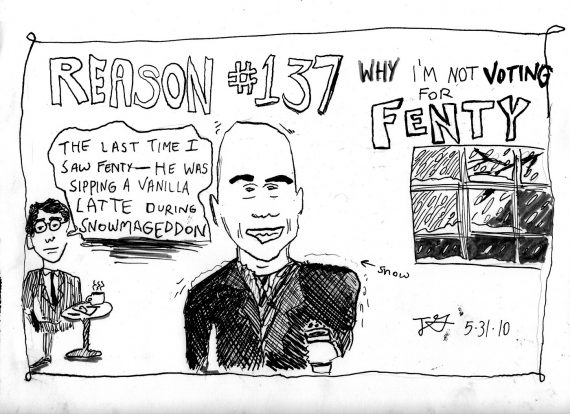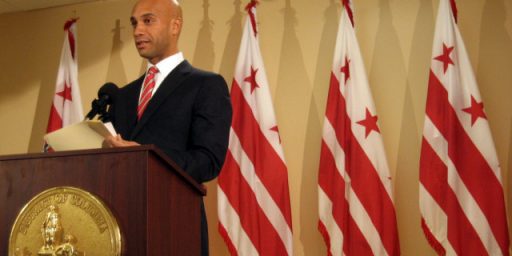Fenty Ouster A Black Tea Party
The Tea Party movement and the populist backlash against DC mayor Adrian Fenty are a sign that things are changing so fast that a lot of people simply can't adjust.
Although it’s been ages since I paid much attention to local politics, the aftermath of the DC mayoral primary/election, in which Adrian Fenty, the black mayor beloved by affluent whites and loathed by most blacks, continues to fascinate. The whites are astounded that Fenty, who was making the city better, was summarily tossed. And they simply can’t comprehend how Michelle Rhee, the school superintendent who seems to be turning around a public school system so bad that those who can possibly afford it refuse to send their kids to, became a lightning rod.
Ta-Nehisi Coates notes, as most have, their abrasive personalities. He observes, “it isn’t enough to be visionary, perceptive, or prophetic. Leadership, in a democracy, isn’t simply a matter of identifying solutions. You also have to convince a critical mass of people to either trust you, or at least trust your solution.”
Megan McArdle agrees but doesn’t see how Fenty or Rhee could have had as much success as they have getting things done with a more easy-going style.
If you try to start small, the changes you make will be overwhelmed by the mostly intact institution, which will exert its powerful influence to neutralize your reforms. Dysfunctional institutions have what you might think of as a powerful immune system–indeed, you could argue that they’re so dysfunctional precisely because they’re so good at repelling invaders.
That’s why radical reformers so often end up vilified (and frankly, so often end up making some colossal bloomers; institutions are complicated, and reformer’s prescriptions are never as complex as the institution they are trying to change). What deal could Rhee have possibly made the teacher’s unions that they would have accepted, and that would actually have given her latitude to try to make radical improvement in reading and math scores?
And I agree. But WaPo columnist Courtland Milloy cuts through all that with an emotionally charged piece titled “D.C. election didn’t just unseat abrasive Mayor Fenty. It was a populist revolt.” No, he’s not being hyperbolic.
And people who need more time to gloat and wave their fists, take it. I know that the presumptive mayor-elect, Vincent Gray, is calling for healing, as he promised on the campaign trail. And that’s all good.
But Fenty was a cruel mayor. He inflicted deep hurts, not little boo-boos that you kiss and blow to heaven and make feel okay overnight.
Air out those wounds.
Having taken office promising to cradle the most vulnerable residents, Fenty set out almost immediately shooting the wounded. Closing homeless shelters. Forgetting about job-training programs. Firing city workers with the wave of a callous hand — black female heads of households more often than not.
Fenty boasted of being a hard-charging, can-do mayor. But he couldn’t find time to meet with 98-year-old Dorothy Height and 82-year-old Maya Angelou. Respect for elders — that’s too old school for Fenty. Dis the sistas — his supporters will understand.
Watch them at the chic new eateries, Fenty’s hip newly arrived “creative class” firing up their “social media” networks whenever he’s under attack: Why should the mayor have to stop his work just to meet with some old biddies, they tweet. Who cares if the mayor is arrogant as long as he gets the job done?
Myopic little twits.
And lordy don’t complain about Rhee.
She’s creating a “world-class school system,” they text. As for you blacks: Don’t you, like, even know what’s good for you? So what if Fenty reneged on his promise to strengthen the city from the inside by helping the working poor move into the middle class. Nobody cares that he has opted to import a middle class, mostly young whites who can afford to pay high rent for condos that replaced affordable apartments.
Don’t ask Fenty or Rhee whom this world-class school system will serve if low-income black residents are being evicted from his world-class city in droves.
There’s more, but you get the idea.
Can I comprehend resentment towards political leadership that catered to affluent whites, trying to lure them from the suburbs and otherwise make the District more hospitable to them while making it less affordable to lower class blacks who already lived there, some for generations? Sure. And, certainly, high-handed and officious leaders are likely to spawn their share of enemies.
But it seems to go beyond that. Milloy, who I presume is well ensconced in the upper middle class by now, seems to have absolute contempt for not only Fenty but the affluent young whites in their posh eateries. And I strongly sense that he’s got his fingers on the pulse of a huge proportion of DC’s black community. And I don’t think it’s mostly about race, per se, but rather culture.
Milloy’s headline naturally put me in mind of the Tea Party movement. And there are strong parallels. There is the same kind of visceral disdain in much of the country for the “creative class” and their posh ways. Barack Obama gets many of the same criticisms from white Tea Partiers as Fenty does from black Washingtonians. He’s arrogant. He likes arugula and French mustard, for goodness sakes! And those pointy headed intellectuals in their ivory towers in DC, New York, and California don’t have any clue what it’s like in Real America, where decent folk do Real Work.
While racial frictions are doubtless running through both the Tea Party and the black revolt against Fenty, there’s something much broader going on. The country and the District are changing so fast that a lot of people simply can’t adjust.
One of Megan’s commenters notes that Fenty seemed to be trying to change DC into Seattle and enthused about what at a good thing that would be! But, while many of us would prefer a Seattle that rained less and was closer to the seat of government, one can understand why people who’ve lived in DC all their live wouldn’t want such a radical transformation. Similarly, there’s fear in some circles that Obama is trying to change America into Sweden. And, while hot blondes and universal health care may sound good, there’s a strong fear that we’ll lose what’s good about America in the process.
Cartoon by Jonathan Guyer







Everybody’s got a grievance against the other guy these days. We’re becoming a country of nothing but bubbling resentment, with everybody clamoring for victim status and looking for scapegoats.
On the other hand, we in Seattle are perfectly happy with the weather and with our distance from the seat of government.
Your observation about it being about culture rather than race is spot on, but that distinction has far more broad implications than just here. In my humble opinion, virtually all present day scuffles about “race” are really about culture.
Gee, and I thought Fenty was brought down by a coordinated effort of the teacher’s union and the service employees union.
Just goes to show how wrong a guy can be.
Still, when poor blacks join together to destroy any chance their kids will learn to read, I wish there was something to call it other than a “Tea Party”.